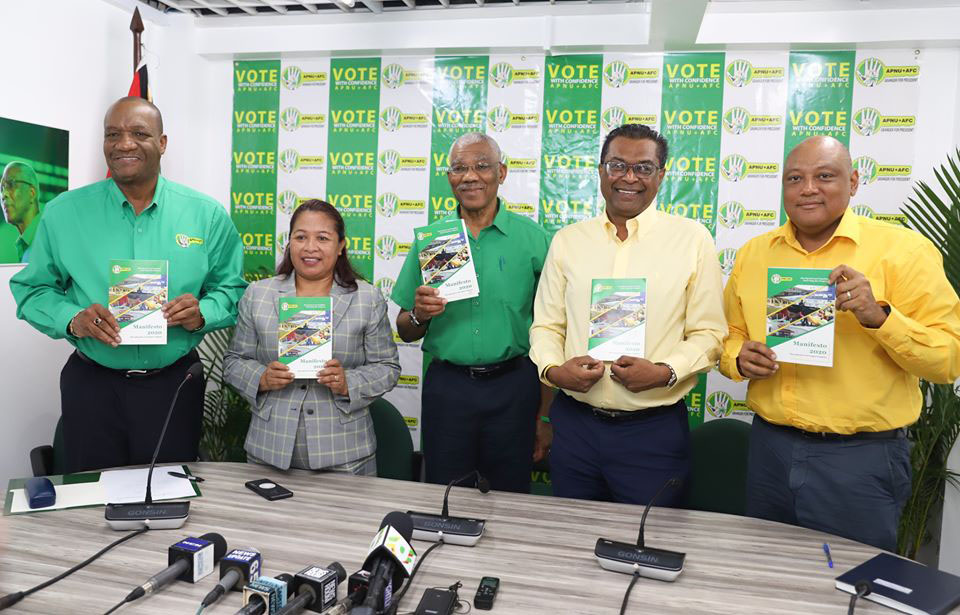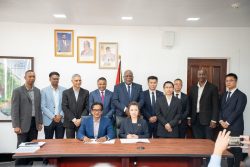Nearly two years after it was first proposed by the Working People’s Alliance (WPA), a system of Direct Cash Transfers has found favour with the incumbent A Partnership for National Unity+Alliance for Change (APNU+AFC).
Facing what will likely be a close general election on March 2nd, the coalition in its 2020 manifesto is promising Guyanese Conditional Cash Transfers based on a feasibility or pilot study.
According to the document released yesterday, on the fifth anniversary of the coalition, these cash transfers will be used for nutritional support, housing support, public transport and a single-parent support programme as well as vouchers for day-care and elder-care services, adult remedial classes and training, increased stipends for students of technical institutes, nursing schools, schools of home economics and the Guyana School of Agriculture.
Further, the coalition has promised cash transfers through the Public Education Assistance Service (PEAS) and for the purchase of essential items.
This is not the US$5,000 per household that was first proposed by economist Dr Clive Thomas but it represents a victory by the party of which he is a part.
“I believe that some portion of the net cash flow from oil should be dedicated and be given as cash transfers to every single household in this country….there must be a mechanism in place to ensure every single household and by extension every single person, sees the benefits of oil and gas in terms of cash or cheque received in their accounts,” Thomas had told a forum in August 2018.
Initially President David Granger was less than welcoming of the idea, telling reporters that he had not considered the proposal.
‘An initial victory’
“It is outside of the recommendations of the Sovereign Wealth Fund, the Natural Resources Fund, and I don’t know that there is a precedent for it. So, I don’t know the evidential basis for making such a proposal and it is not part of the proposal for the Sovereign Wealth Fund,” he said a few days later.
The promise in the manifesto appears to be a compromise between the two positions as a feasibility or pilot study would give Granger the “evidential basis” for the policy while the wide range of uses listed are likely to see “every single household” benefit from oil and gas as first proposed by Thomas.
Executive member of the WPA, David Hinds in an invited comment told Stabroek News that his party welcomes the embrace of the Cash Transfer policy not just by the incumbent of which they are a part but also by the main opposition People’s Progressive Party/Civic (PPP/C).
The PPP/C has proposed to implement targeted cash transfers to Guyanese, particularly the elderly, children, the poor and other vulnerable groups, if it wins the March 2nd elections.
“Traditionally parties by their very nature do not embrace revolutionary policies unless they are pushed to that point. That is what happened here. WPA’s advocacy of the idea in the face of serious pushback by the political elites in both major parties and our decision to plant it among the people have led to this outcome,” he said.
According to Hinds the embrace of the policy by the major parties is to him a rejection of the thesis that so-called small parties do not play major roles in society and the backward notion that the Coalition is all about the People’s National Congress Reform (PNCR).
“Above and beyond that, it as an initial victory for the Guyanese people who are the ones that would benefit from the policy,” he stressed.
He argued that cash transfer is the only new and innovative policy that has been advanced since the announcement that Guyana would become an oil-rich nation and stressed that if properly implemented, it would transform the lives of the poor and the powerless in dramatic ways.
“For the first time, poor people would have added income to use in ways that they see fit. It has the potential of banishing the “pay cheque to pay cheque” syndrome that bedevils poor people,” he said adding that the WPA is proud to have been the initiator of this policy initiative which is being successfully used to tackle poverty by many societies across the world.
“We emphasise our pioneer role in this regard because in Guyana we tend to think of a party’s worth solely in terms of its ability to directly win votes,” Hinds noted.
The question of how to use and manage oil revenue is one which is pivotal to the current election. The coalition manifesto does not specifically identify oil revenue as a means of financing any particular policy but Prime Ministerial Candidate Khemraj Ramjattan has noted that an APNU+AFC government will use the plan for a ‘Decade of Development’ and oil revenue to transform Guyana for the benefit of all Guyanese.
Under the governance programme, the incumbent has promised to fully implement the Natural Resource Fund Act and implement the recommendation of the Guyana Extractive Industries Transparency Initiative (GY-EITI) Report from the 2017 fiscal year in order to improve the EITI process.
The incumbent has also promised to implement measures within the Guyana Revenue Authority (GRA) to monitor the oil and gas sector, institutionalise the new production sharing model and amend the Petroleum (Exploration and Production) Act.
The recently completed Local Content Policy is to be enshrined in law and the local workforce developed and utilised so that Guyanese can participate fully in this new sector.
Supplier development and utilisation so that Guyanese businesses could participate in, and benefit, from this new sector; and, knowledge and technology transfer to equip people to be integral in this sector are also promised.
“It is our contract with the people. Put us back in government and these are the things we will do and certainly with the revenue stream these are the things we are going to get done. It is our action plan,” Ramjattan said of the manifesto.










